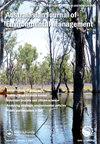Beyond mains water: a survey of households that are self-sufficient for water in regional Australia
IF 1.5
4区 社会学
Q4 ENVIRONMENTAL STUDIES
Australasian Journal of Environmental Management
Pub Date : 2021-04-03
DOI:10.1080/14486563.2021.1919233
引用次数: 2
Abstract
ABSTRACT There is little recognition in policy of existing adaptive capacities and experiments with alternate water systems in the Global North. Households that are self-sufficient for water present a space in which alternative relationships between water, comfort and convenience manifest. This article presents insights from a survey completed by 209 households that are self-sufficient for water in the Eurobodalla Shire, in regional New South Wales, Australia. The survey sought to understand practices, experiences, and perceptions of people who take responsibility for managing the capture, storage, consumption, and disposal of water at home. We found that most respondents rely on household-collected rainwater for all domestic purposes. Most drink rainwater, and many drink rainwater untreated. Respondents identified challenges of self-sufficiency, including running out of water, and infrastructure maintenance and failure. Notwithstanding these challenges, most respondents indicated that they enjoy living in a water self-sufficient home and would do so again in future. Most respondents moved to their non-mains water home for reasons other than being in control of water; adapting to water self-sufficiency was therefore a necessity rather than a choice. The results of this survey are significant as the water sector looks to diversify sources of domestic water to better adapt to uncertain futures.自来水之外:对澳大利亚地区自给自足的家庭的调查
在政策上,很少有人认识到全球北方现有的适应能力和替代水系统的实验。水自给自足的家庭呈现出一个空间,在这个空间中,水、舒适和便利之间的替代关系显现出来。本文介绍了对澳大利亚新南威尔士州Eurobodalla郡209户自给自足的家庭进行的一项调查的见解。该调查旨在了解负责管理家庭用水的捕获、储存、消费和处理的人们的做法、经验和看法。我们发现,大多数受访者依靠家庭收集的雨水来满足所有家庭用途。大多数人喝雨水,许多人喝未经处理的雨水。受访者指出了自给自足的挑战,包括缺水、基础设施维护和故障。尽管面临这些挑战,大多数受访者表示,他们喜欢生活在水自给自足的家中,并将在未来再次这样做。大多数回答者迁入非供水住宅并非出于控制用水的原因;因此,适应水的自给自足是一种必要,而不是一种选择。这项调查的结果意义重大,因为水务部门希望使生活用水来源多样化,以更好地适应不确定的未来。
本文章由计算机程序翻译,如有差异,请以英文原文为准。
求助全文
约1分钟内获得全文
求助全文
来源期刊

Australasian Journal of Environmental Management
ENVIRONMENTAL STUDIES-
CiteScore
2.60
自引率
0.00%
发文量
16
 求助内容:
求助内容: 应助结果提醒方式:
应助结果提醒方式:


